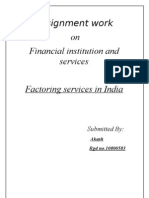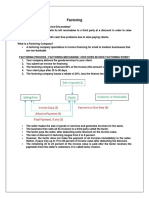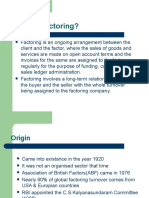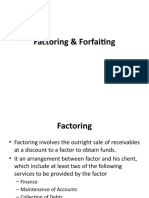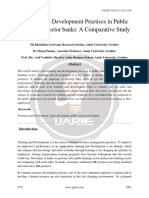0% found this document useful (0 votes)
20 views12 pagesFactoring
Factoring is a financial service that allows businesses to convert their accounts receivable into immediate cash by selling trade debts to a financial institution at a discount, improving liquidity. The process involves an agreement with a factor, submission of invoices, debt assignment, collection by the factor, and remittance of funds to the firm. Factoring offers various benefits, including credit coverage, cash advances, and valuable business insights, and is distinct from forfaiting, which focuses on international trade receivables.
Uploaded by
Thamizhan KitchenCopyright
© © All Rights Reserved
We take content rights seriously. If you suspect this is your content, claim it here.
Available Formats
Download as PDF, TXT or read online on Scribd
0% found this document useful (0 votes)
20 views12 pagesFactoring
Factoring is a financial service that allows businesses to convert their accounts receivable into immediate cash by selling trade debts to a financial institution at a discount, improving liquidity. The process involves an agreement with a factor, submission of invoices, debt assignment, collection by the factor, and remittance of funds to the firm. Factoring offers various benefits, including credit coverage, cash advances, and valuable business insights, and is distinct from forfaiting, which focuses on international trade receivables.
Uploaded by
Thamizhan KitchenCopyright
© © All Rights Reserved
We take content rights seriously. If you suspect this is your content, claim it here.
Available Formats
Download as PDF, TXT or read online on Scribd
/ 12










